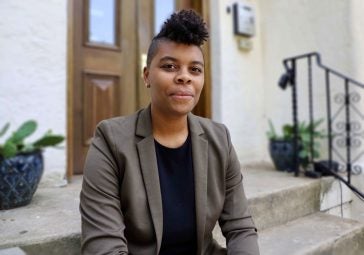 Inclusive SciComm Symposium Planning Committee member Dr. Alex Moore believes their identity is intrinsically linked to their research. “My collective identities influence how I do my work because they inform the way I view and ask questions, the approaches I take to addressing them, and how I engage in communication across communities with those of varying perspectives,” says Dr. Moore, a National Science Foundation post-doctoral fellow in the Center for Biodiversity and Conservation at the American Museum of Natural History. “I often forget that I am doing science communication because it’s such an integrated aspect of my work,” states Dr. Moore.
Inclusive SciComm Symposium Planning Committee member Dr. Alex Moore believes their identity is intrinsically linked to their research. “My collective identities influence how I do my work because they inform the way I view and ask questions, the approaches I take to addressing them, and how I engage in communication across communities with those of varying perspectives,” says Dr. Moore, a National Science Foundation post-doctoral fellow in the Center for Biodiversity and Conservation at the American Museum of Natural History. “I often forget that I am doing science communication because it’s such an integrated aspect of my work,” states Dr. Moore.
Dr. Moore has navigated academic systems that lack diversity while recognizing the pressures of traditional academic institutions. “Because I am often marginalized in the spaces that I occupy, I am acutely aware of myself and my interactions in those spaces in ways that inform how I work,” states Moore, “For example, in my interviews and interactions with research participants, I am often very aware of power dynamics, social queues, and body language in others in a way that I hope helps me do a better job of ensuring that others feel comfortable and safe engaging with me.” It’s one of the reasons Dr. Moore mentors peers and students facing the same challenges. “I want to create spaces that feel truly inclusive to diverse students, spaces that don’t require additional labor to exist in,” they explain.
Dr. Moore’s scientific research focuses on how we understand the ecology of coastal wetland ecosystems and how that knowledge can be applied to conservation and restoration efforts. They enhance their research by engaging local communities to incorporate their community knowledge of wetlands’ land use values.
Their work reaches far beyond the bounds of their studies of coastal ecosystems. Dr. Moore teaches and shares their work through programs at the American Museum of Natural History, seminars across the country, as a mentor in a research program for high school students, and as a professor at Columbia and Princeton. “A big part of my work is to integrate science with who we are as people and to bring in different kinds of communities into the work we are doing,” they describe.
Reflective of their approach towards building an inclusive science community, Dr. Moore also asks their students to consider how their identities inform their research and to explore the implications of that influence. “It is really important to know how socialization and our identities are affecting the work we are doing,” says Dr. Moore. “Science is not separate from all of these influences, so I try to pull it all together whenever I can,” they remark.
Dr. Moore is shifting how we think about the traditional role of a scientist by incorporating the nuances of identity, values, perspectives, and culture into their work. “I know adding nuances makes things harder but it also makes things more realistic,” said Dr. Moore.
They bring these perspectives and more to their role as a member of the Planning Committee for the 2021 Inclusive SciComm Symposium, a convening of hundreds of people from across the country who are engaged in, or want to learn more about, inclusive science communication. “I am quite honored to be part of a group where my experience, perspectives, and values are acknowledged,” they stated.
For this article Dr. Alex Moore uses “they/them” pronouns but prefers no pronouns at all, just Alex. Alex believes that there are a lot of assumptions around gendered pronouns, including they/them, that lead to people inferring what type of person you are. Just going by “Alex” helps to eliminate those assumptions.
Written by Hannah MacDonald. She’s in her second year of a URI College of the Environment and Life Sciences (CELS) Communications Fellowship. The Fellowship was established in 2014 to help graduate students gain hands-on science communication experience by interviewing, writing for audiences, and creating content for the CELS website, social media, and newsletter.
